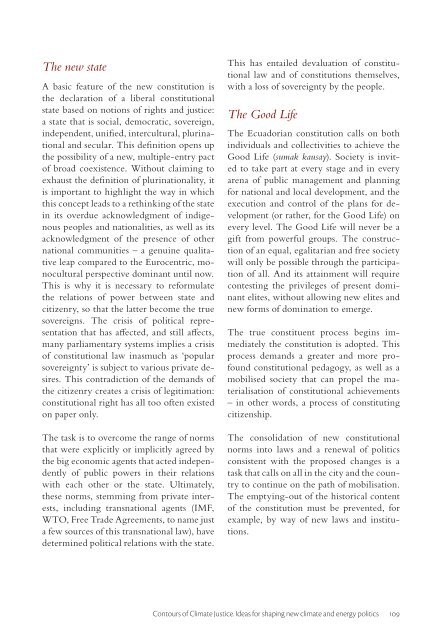Contours of Climate Justice - Dag Hammarskjöld Foundation
Contours of Climate Justice - Dag Hammarskjöld Foundation
Contours of Climate Justice - Dag Hammarskjöld Foundation
Create successful ePaper yourself
Turn your PDF publications into a flip-book with our unique Google optimized e-Paper software.
The new state<br />
A basic feature <strong>of</strong> the new constitution is<br />
the declaration <strong>of</strong> a liberal constitutional<br />
state based on notions <strong>of</strong> rights and justice:<br />
a state that is social, democratic, sovereign,<br />
independent, unifi ed, intercultural, plurinational<br />
and secular. This defi nition opens up<br />
the possibility <strong>of</strong> a new, multiple-entry pact<br />
<strong>of</strong> broad coexistence. Without claiming to<br />
exhaust the defi nition <strong>of</strong> plurinationality, it<br />
is important to highlight the way in which<br />
this concept leads to a rethinking <strong>of</strong> the state<br />
in its overdue acknowledgment <strong>of</strong> indigenous<br />
peoples and nationalities, as well as its<br />
acknowledgment <strong>of</strong> the presence <strong>of</strong> other<br />
national communities – a genuine qualitative<br />
leap compared to the Eurocentric, monocultural<br />
perspective dominant until now.<br />
This is why it is necessary to reformulate<br />
the relations <strong>of</strong> power between state and<br />
citizenry, so that the latter become the true<br />
sovereigns. The crisis <strong>of</strong> political representation<br />
that has aff ected, and still aff ects,<br />
many parliamentary systems implies a crisis<br />
<strong>of</strong> constitutional law inasmuch as ‘popular<br />
sovereignty’ is subject to various private desires.<br />
This contradiction <strong>of</strong> the demands <strong>of</strong><br />
the citizenry creates a crisis <strong>of</strong> legitimation:<br />
constitutional right has all too <strong>of</strong>ten existed<br />
on paper only.<br />
The task is to overcome the range <strong>of</strong> norms<br />
that were explicitly or implicitly agreed by<br />
the big economic agents that acted independently<br />
<strong>of</strong> public powers in their relations<br />
with each other or the state. Ultimately,<br />
these norms, stemming from private interests,<br />
including transnational agents (IMF,<br />
WTO, Free Trade Agreements, to name just<br />
a few sources <strong>of</strong> this transnational law), have<br />
determined political relations with the state.<br />
This has entailed devaluation <strong>of</strong> constitutional<br />
law and <strong>of</strong> constitutions themselves,<br />
with a loss <strong>of</strong> sovereignty by the people.<br />
The Good Life<br />
The Ecuadorian constitution calls on both<br />
individuals and collectivities to achieve the<br />
Good Life (sumak kausay). Society is invited<br />
to take part at every stage and in every<br />
arena <strong>of</strong> public management and planning<br />
for national and local development, and the<br />
execution and control <strong>of</strong> the plans for development<br />
(or rather, for the Good Life) on<br />
every level. The Good Life will never be a<br />
gift from powerful groups. The construction<br />
<strong>of</strong> an equal, egalitarian and free society<br />
will only be possible through the participation<br />
<strong>of</strong> all. And its attainment will require<br />
contesting the privileges <strong>of</strong> present dominant<br />
elites, without allowing new elites and<br />
new forms <strong>of</strong> domination to emerge.<br />
The true constituent process begins immediately<br />
the constitution is adopted. This<br />
process demands a greater and more pr<strong>of</strong>ound<br />
constitutional pedagogy, as well as a<br />
mobilised society that can propel the materialisation<br />
<strong>of</strong> constitutional achievements<br />
– in other words, a process <strong>of</strong> constituting<br />
citizenship.<br />
The consolidation <strong>of</strong> new constitutional<br />
norms into laws and a renewal <strong>of</strong> politics<br />
consistent with the proposed changes is a<br />
task that calls on all in the city and the country<br />
to continue on the path <strong>of</strong> mobilisation.<br />
The emptying-out <strong>of</strong> the historical content<br />
<strong>of</strong> the constitution must be prevented, for<br />
example, by way <strong>of</strong> new laws and institutions.<br />
<strong>Contours</strong> <strong>of</strong> <strong>Climate</strong> <strong>Justice</strong>. Ideas for shaping new climate and energy politics 109
















